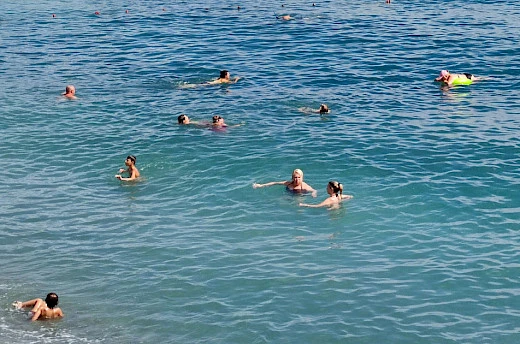In Turkey, vacationers are struck by cholera-like vibrios — tourists report mass poisoning symptoms after swimming

Russians who vacationed in Turkey this summer began experiencing symptoms of poisoning after swimming in the sea — often affecting entire families, and sometimes occurring at the level of individual hotels.
On social media and in the news, a probable infection caused by bacteria of the genus Vibrio is being discussed — a broad class of Gram-negative microorganisms that inhabit salt and brackish water. Their habitats include the waters of the Mediterranean, Aegean, and Marmara Seas, as well as the Gulf of Mexico and waters of Southeast Asia.
The most dangerous Vibrio species include:
Vibrio cholerae — the causative agent of cholera;
Vibrio vulnificus — particularly dangerous for people with skin injuries, as it can cause rapid soft tissue destruction, necrosis, and sepsis;
Vibrio parahaemolyticus — often causes food poisoning from raw or poorly cooked seafood, leading to acute gastrointestinal disorders;
Vibrio alginolyticus — capable of causing wound infections and otitis.
Transmission routes to humans:
— consumption of inadequately cooked seafood;
— contact of water with open wounds, scratches, cuts, or bites on the skin.
High-risk groups include people with weakened immune systems. According to official Russian sources, no cases of Vibrio infection have been registered in Russia in 2025. However, similar situations abroad are concerning, as Turkey is seeing an increase in cases among tourists.
Areas with frequent visits to medical facilities are Alanya and Belek. Tourists report that just a few hours after swimming, they experienced vomiting, severe weakness, and body temperature above 38 °C. Symptoms only subsided after intravenous rehydration, and queues in private clinics and emergency departments along the Turkish coast became noticeable.
At the same time, Turkish urologist Ugur Aferin (Florence Nightingale Hospital, Istanbul) warned that along the coasts of the Marmara, Aegean, and Mediterranean Seas, DNA of Vibrio parahaemolyticus and Vibrio vulnificus has been detected. These microorganisms multiply in warm, salty water. The doctor noted a particular risk from contact with seawater through open wounds, which can lead to life-threatening infections, including necrotizing fasciitis — the so-called "flesh-eating" form of the disease.
It has also been noted that the risk of infection is higher when consuming raw oysters or other seafood. In people with weakened immunity, such infections can progress to sepsis and even become fatal.
Nevertheless, some experts assess the risks as minimal. Some experts argue that reports of “new dangerous bacteria” are greatly exaggerated: Vibrio parahaemolyticus and vulnificus are common marine microorganisms, seasonal, and appear every year when water temperatures rise above +20 °C. They do not cause cholera — the disease or fatal outcomes are unlikely, especially when following simple rules: avoid raw seafood and do not swim with open wounds.
Other sources confirm that Turkish authorities have not registered mass infections among tourists, and cases of illness remain extremely rare.
You may also be interested in:
- Rain and thunderstorms expected from Sunday: temperatures to drop to +15°C
- Disinfection points for animal transport established in the Famagusta district
- CTP and AKEL agreed to establish a Joint Sports Working Group
- The Union of Insurance Companies called for the prompt introduction of mandatory natural disaster insurance
- Ercan Airport sets record: over 5.2 million passengers in 11 months


